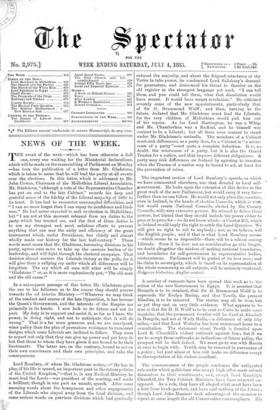Lord Rosebery, of whom Mr. Gladstone writes,—" He has to
play, if his life is spared, an important part in the future politics of the United Kingdom,"—that is, in any Radical Ministry he must lead the Lords—was president of the meeting, and made a brilliant, though in one part an unsafe, speech. After some amusing words about the honeymoon and other engagements of the Liberals who stayed away from the fatal division, and some serious words on previous divisions which had gradually
reduced the majority, and about the feigned reluctance of the Tories to take power, he condemned Lord Salisbury's demand for guarantees, and denounced his threat to dissolve on the old register in the strongest language yet used. "I can tell them, and you could tell them, what that dissolution would have meant. It would have meant revolution." He criticised severely some of the new appointments, particularly that of Sir H. Drummond Wolff ; and then, turning to the future, declared that Mr. Gladstone must lead the Liberals, for the very children of Midlothian would pull him out of his repose. As for Lord Hartington, he was a Whig, and Mr. Chamberlain was a Radical, and he himself was content to be a Liberal ; but all three were content to stand under Mr. Gladstone's umbrella. The members of a Cabinet must sink differences, as a party does, for a Cabinet is " a micro- cosm of a party "—not quite a complete definition. It is, no doubt, the microcosm of a party, but it is also the Grand Trustee for a nation, and that imposes different obligations. A party may sink differences on Ireland by agreeing to inaction when the Trustee of a nation may be bound to act, at least for the prevention of crime.


































